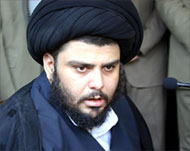Al-Jaafari warns of US interference
Ibrahim al-Jaafari, the Iraqi prime minister, has warned against US interference in his country’s politics and defended his ties to a Shia militia.

With backing from Shia parties, Prime Minister al-Jaafari is seeking to stay in office but his candidacy has proved contentious among parliamentary factions, which have yet to agree on a national unity government three months after national elections.
In an interview with The New York Times published on Thursday, al-Jaafari said that certain comments from US officials had undermined the US president’s public stance in favour of democracy in Iraq.
“There was a stand from both the American government and President Bush to promote a democratic policy and protect its interests,” he told the paper in an interview conducted at his Baghdad home.
“But now there’s concern among the Iraqi people that the democratic process is being threatened.”
Al-Jaafari appeared to be referring to US concerns over his candidacy amid reports that US officials were actively lobbying for other figures who might be able to draw support from Kurdish and Sunni leaders who oppose al-Jaafari.
“The source of this is that some American figures have made statements that interfere with the results of the democratic process,” he said, without elaborating.
“These reservations began when the biggest bloc in Parliament chose its candidate for prime minister.”
US reaction
Three months after the national elections, Iraqi efforts to form a government have been delayed by bickering over cabinet posts and resistance to al-Jaafari’s drive to keep his job.
Al-Jaafari’s comments came a day after the White House denied reports from Iraq that Bush had told a top Shia leader that he opposed al-Jaafari as the country’s next prime minister.
Adam Ereli, deputy State Department spokesman said: “I don’t think we’ve made any such statements.
“The future of Iraq and the development of its political institutions is in the hands of Iraqis.
“We are a friend of Iraq. We are there to support them in that endeavour and to assist them in that process as we can,” Ereli said.
Disagreement
Kurdish and Sunni representatives accuse al-Jaafari of running a sectarian-tinged government and collaborating with Muqtada al-Sadr, who leads a powerful Shia militia and controls a bloc of 32 seats in the parliament.
 |
|
Muqtada al-Sadr controls a bloc |
But al-Jaafari defended including militia leaders such as al-Sadr in the political arena, though he did not say in the interview what concessions he may have granted to al-Sadr, the newspaper reported.
He said he disagreed with Paul Bremer, the former US administrator in Baghdad, who barred al-Sadr and some other militia groups from participating in the political process.
“I look at them as part of Iraq’s de facto reality, whether some of the individual people are negative or positive,” he told The Times.
“Anyone who’s part of the Iraqi reality should be part of the Iraqi house.”
Army and police
The Iraqi government’s approach to militias would be to “meld them, take them, take their names and make them join the army and police forces. And they will respect the army or police rather than the militias,” al-Jaafari said.
He said that key ministries would go to figures without ties to militias or clear sectarian bias.
“We insist that the ministers in the next cabinet, especially the ministers of defence and the interior, shouldn’t be connected to any militias, and they should be non-sectarian,” he said.
Efforts to form a government suffered another setback on Wednesday when a crucial meeting, which was to have been hosted by Jalal Talabani, the Iraqi president, was cancelled after Sunnis and Shia clashed over who will control the security portfolio in the next government.